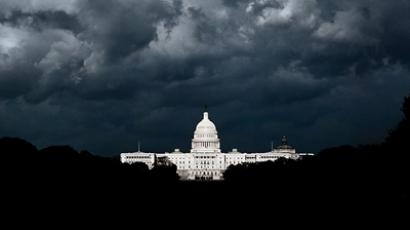CISPA: A 'vaguely-defined' bill against an 'imaginary threat'
The House of Representative has passed CISPA, a bill seeking to increase the government's power to monitor private data online. Political commentator Luke Samuel says the law is directed against a nebulously-defined and imaginary threat.
Luke Samuel, who writes for Spiked magazine, sat down with RT to talk about the reasons why there’s such a push for the bill to be adopted – and what it means for Internet users. RT: Is CISPA really so bad for the average user? If you do nothing wrong, what does anybody have to worry about it?Luke Samuel: Well, this is the common attitude in the discussion around privacy. Effectively, if you’ve got nothing to hide, you shouldn’t be worried about passing over your private information. And I actually think that’s a really damaging attitude. We as citizens have a right to hold back information from the state and from government snoops. So I think this portrays what’s underlying a lot of anti-privacy legislation around the world, not just online, but also offline. This attitude that being able to hold your personal information is no longer important, which it is.
‘No one really knows what cyber security actually means, which makes CISPA a far more dangerous act. ’
RT:We’ve seen so much of these web-regulating lawmaking attempts, SOPA, PIPA, and now CISPA. Why is it all coming at once?LS: Well it’s important, actually, to distinguish CISPA from the rest of them because CISPA is not about intellectual property. This is an act about something far more nebulous. It’s about protecting "cyber security." And by the way, no one really knows what cyber security actually means, which makes it a far more dangerous act. It’s effectively giving the American government significant powers to inspect and to snoop, to investigate concerns which no one has really defined. And that’s what a lot of campaigners around this act have pointed out. But these terms are fundamentally ill-defined and nebulous. That actually makes it a more dangerous piece of legislation than those that have gone before it. RT:Thousands of Europeans came out against ACTA. What can they do about CISPA? It’s a US law, but it could still reach them if they use, for instance, Google. LS: Well that’s absolutely right. But that also underplays the role that the British government specifically have played during much the same in lawmaking over here. We know that earlier this year the coalition government in the United Kingdom announced plans very similar to what’s being proposed in CISPA now: the power to effectively intercept and read private communications from the web. CISPA does affect an international audience, but it almost doesn’t need that because governments, especially in the United Kingdom, are sharing that impulse to interfere in our private Internet communications. It’s an extremely worrying global trend.
‘Can anyone actually name a significant act of cyber terrorism that has happened in the West, ever?’
RT: Cyber security is a concern, though. A lot of sensitive information is online these days. Isn’t it time to have some more tightened laws to police it if it gets out of hand? LS: Well, that’s the wrong focus. What we should be discussing is our right to retain information. Sure, there may be some spotty jihadi sympathizers out there who may want to come and infiltrate our Internet security. To be honest, I think these spotty jihadists exist more in the minds of Western governments than they do anywhere in reality. Can anyone actually name a significant act of cyber terrorism that has happened in the West, ever? No, because it never has. It’s an imagined threat. And it’s an imagined threat which now threatens our freedom online and threatens our experience of the Internet. So the fact that this legislation is being effectively introduced in response to an imagined threat actually adds to the suspicion and danger around it. I don’t think this is about Internet security. I think it’s about national security generally. I think this act is more likely to be used to control and monitor efforts to organize terrorist attacks offline. The danger with that is that in America specifically, we’ve recently had arrests of individuals for encouraging al-Qaeda sympathies. Now, that couldn’t be possible under the American legal system because of the First Amendment. And because of these recent cases, there’s a radical reinterpretation underway of the First Amendment and, more broadly, free speech’s position in American society. So I don’t think we should be concerned about that small minority that might try to shut down MasterCard for another half an hour. We should be concerned about the American government’s will and drive to control not just our freedom online, but our freedom to publish ideas more widely. The House of Representatives approved CISPA, which stands for the Cyber Intelligence Sharing and Protection Act, with a vote of 248-168 on Thursday. The Senate is set to discuss and vote on the legislation, after which it will go to President Obama’s desk. The White House has so far come out with a statement saying Obama will be advised to veto the legislation. CISPA was introduced by Representative Mike Rogers last November and has since been amended a number of times. The bill has been censured by a number of famous personalities and NGOs, including Tim Bernars-Lee, the man credited with creating the World Wide Web, and the American Civil Liberties Union (ACLU).














